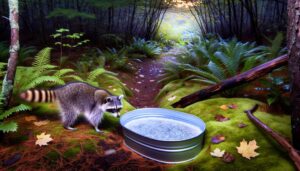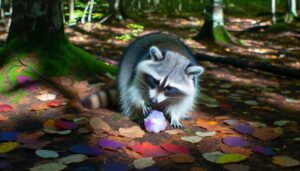Do Raccoons Like Sunflower Seeds?
Raccoons exhibit a notable preference for sunflower seeds due to their rich nutritional content, including proteins, healthy fats, vitamins, and minerals. These seeds contribute to the raccoons' dietary needs, offering essential nutrients that support muscle development, energy metabolism, and immune function.
Observations show that raccoons utilize their dexterous paws to efficiently forage and consume sunflower seeds, especially during late summer and fall. Their attraction to bird feeders in urban areas highlights the ease of access to these seeds.
Understanding raccoons' dietary habits, particularly their fondness for sunflower seeds, provides deeper insights into managing local wildlife interactions.
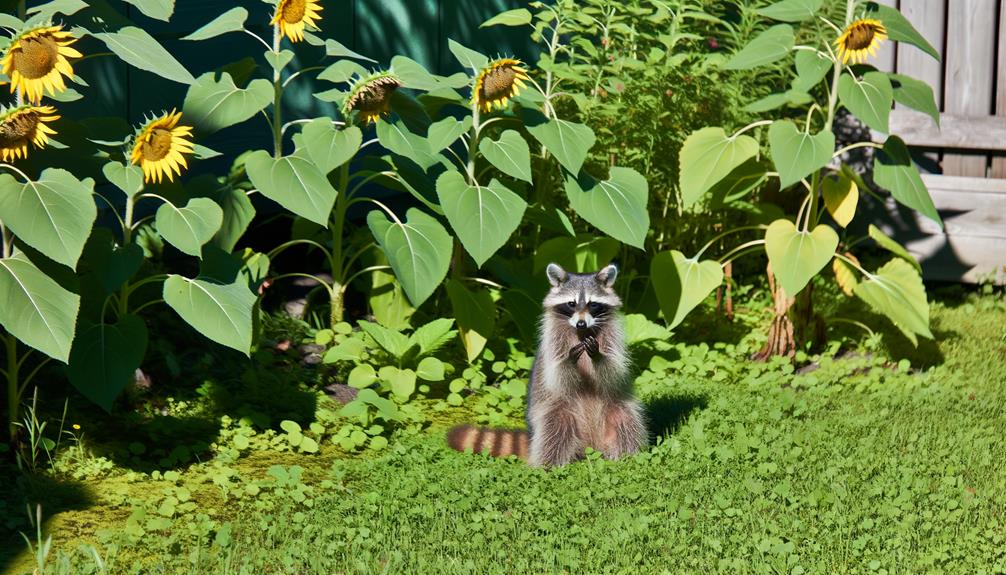
Key Takeaways
- Raccoons exhibit a marked preference for sunflower seeds in their diet.
- Sunflower seeds are rich in protein, healthy fats, and essential vitamins.
- Raccoons use their dexterous paws to efficiently extract and consume sunflower seeds.
- Bird feeders with sunflower seeds attract raccoons due to easy access and high nutritional value.
- Raccoons selectively forage for sunflower seeds, especially during late summer and fall.
Raccoon Dietary Preferences
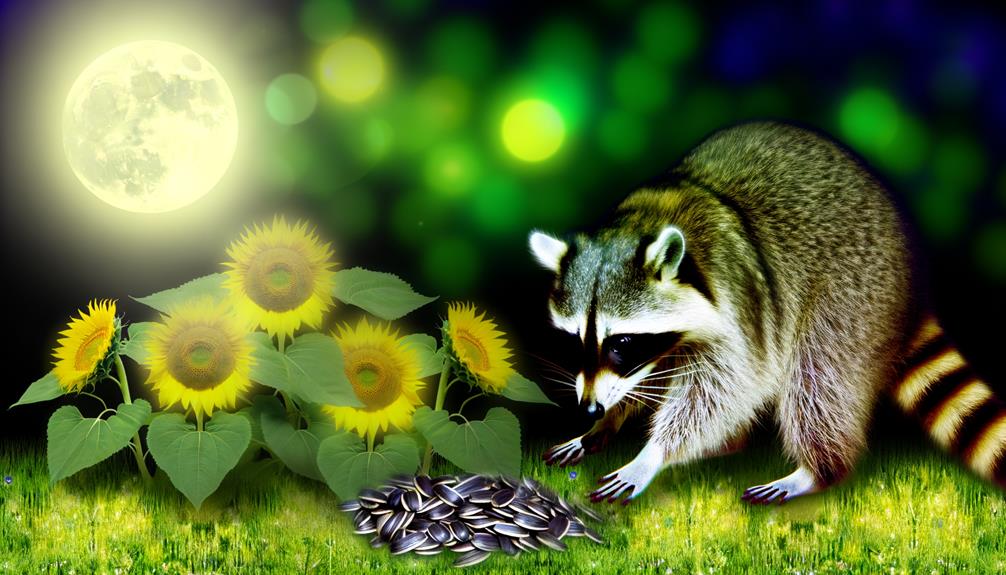
Raccoons, known for their omnivorous diet, exhibit a wide range of dietary preferences that include fruits, vegetables, insects, small animals, and various seeds. Studies have shown that raccoons adapt their diet based on seasonal availability and geographical location. During spring and summer, they primarily consume fruits and insects, while in autumn and winter, their diet shifts to nuts and seeds.
Research indicates that raccoons possess strong dexterous skills, enabling them to forage efficiently in diverse environments. This adaptability is pivotal for their survival in both urban and rural settings. Analysis of raccoon scat has revealed a significant presence of seeds, highlighting their role in the raccoon's diet. This dietary flexibility underscores their opportunistic feeding behavior.
Nutritional Needs of Raccoons
Understanding the nutritional needs of raccoons involves analyzing their requirements for macronutrients such as proteins, fats, and carbohydrates, as well as essential vitamins and minerals. Raccoons are omnivorous, necessitating a balanced diet to maintain peak health. Protein intake is essential for growth and tissue repair, typically comprising about 20-30% of their diet.
Fats provide a concentrated energy source and essential fatty acids, contributing approximately 15-20% of their dietary needs. Carbohydrates, including fibers, should make up around 50-60% of their intake, aiding in digestion and energy provision. Additionally, vitamins A, D, E, and B-complex, along with minerals like calcium and phosphorus, are vital for metabolic processes and skeletal health. A deficiency or imbalance in any of these nutrients can lead to health issues.
Common Foods Raccoons Eat
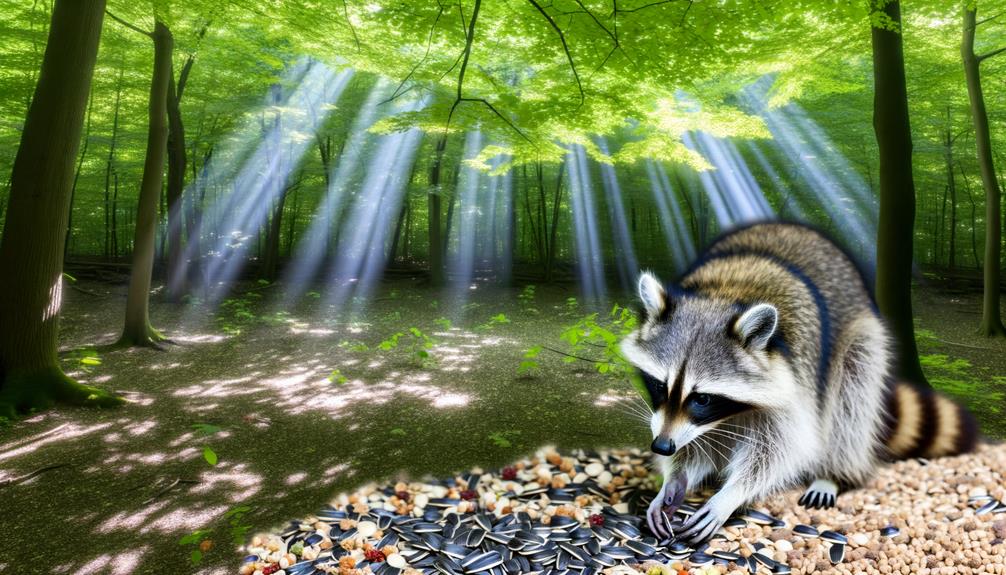
Raccoons have an omnivorous diet that includes a wide variety of foods. They frequently consume fruits and vegetables, such as berries and corn, alongside insects and small animals like crayfish and rodents.
Additionally, raccoons are known to scavenge human food scraps, which can include anything from leftover pizza to discarded fruits.
Fruits and Vegetables
Among the various fruits and vegetables that constitute a part of a raccoon's diet, berries, apples, grapes, corn, and even leafy greens have been observed as frequent choices. Studies indicate that raccoons are opportunistic feeders, consuming available produce based on seasonal availability.
Berries such as blackberries and raspberries provide essential nutrients and are often consumed during summer months. Apples and grapes are also favored due to their high sugar content, which offers a quick energy source.
Corn, particularly in agricultural areas, is a significant part of their diet, providing carbohydrates and fiber. Additionally, leafy greens, though less frequently consumed, contribute to their overall nutritional intake by supplying vitamins and minerals.
This diverse diet aids raccoons in thriving across varied habitats.
Insects and Small Animals
In addition to fruits and vegetables, raccoons frequently consume a variety of insects and small animals, which serve as critical sources of protein and fat. Field observations indicate that raccoons commonly prey on beetles, grasshoppers, and caterpillars, providing essential nutrients for their diet.
They are also known to hunt small vertebrates such as frogs, fish, and birds. A study published in the Journal of Wildlife Management found that over 40% of raccoon diets consist of animal matter, highlighting their opportunistic feeding behavior.
These dietary habits not only fulfill their nutritional needs but also impact local ecosystems by controlling insect populations and influencing the dynamics of small animal communities. This omnivorous diet underscores the adaptability and survival strategies of raccoons.
Human Food Scraps
Often scavenging near human settlements, these adaptable mammals frequently incorporate human food scraps into their diet, reflecting their opportunistic and resourceful nature. Research indicates that raccoons consume a diverse array of human food waste, including but not limited to fruits, vegetables, meats, and processed foods. The following table provides a detailed overview of common human food scraps that raccoons are known to consume:
| Food Type | Examples |
|---|---|
| Fruits | Apples, Berries, Grapes |
| Vegetables | Carrots, Corn, Potatoes |
| Meats | Chicken, Fish, Beef |
| Grains and Seeds | Bread, Rice, Sunflower Seeds |
| Processed Foods | Pizza, Chips, Cookies |
These findings underscore the raccoon's ability to exploit various food sources, allowing them to thrive in diverse environments.
Attraction to Bird Feeders
Raccoons are frequently attracted to bird feeders due to the availability of easily accessible food sources, including sunflower seeds, which are a preferred snack.
Studies have shown that raccoons possess a keen sense of smell and dexterous paws, enabling them to locate and extract food with ease.
Bird feeders, often placed in gardens and backyards, provide an opportune feeding ground, especially during nighttime when raccoons are most active.
A survey conducted by the National Wildlife Research Center revealed that 67% of raccoon sightings in urban environments occurred near bird feeders.
The combination of high-calorie content and minimal foraging effort makes sunflower seeds particularly appealing to these nocturnal mammals, thereby increasing their presence in residential areas.
Role of Seeds in Diet
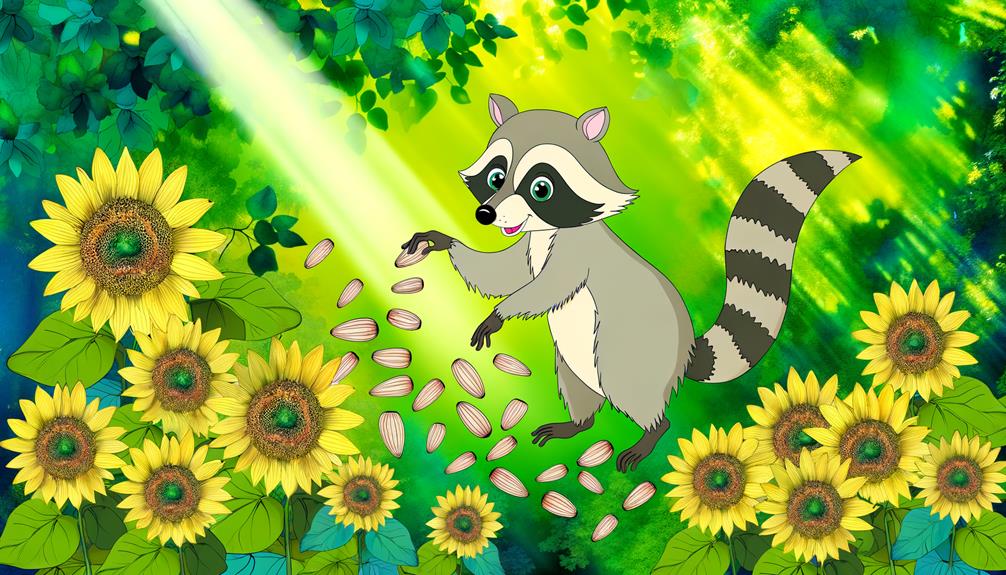
Understanding the role of seeds in a raccoon's diet requires a detailed analysis of their nutritional value. This includes high levels of fats and proteins that are critical for energy sustenance.
Investigating seed variety preferences reveals raccoons' tendencies to select seeds based on availability and nutrient content.
Additionally, examining their foraging behavior provides insights into how raccoons locate and prioritize different seed types in their natural habitat.
Nutritional Value Analysis
Sunflower seeds serve as a rich source of essential nutrients such as protein, healthy fats, and various vitamins and minerals, making them a valuable component in the diet of raccoons.
Specifically, sunflower seeds contain approximately 21 grams of protein per 100 grams, which is vital for muscle development and repair.
The high fat content, nearly 51 grams per 100 grams, mainly comprises polyunsaturated and monounsaturated fats, beneficial for raccoons' overall energy levels and metabolic health.
Additionally, sunflower seeds are abundant in micronutrients like Vitamin E, magnesium, and selenium, which contribute to antioxidative defenses and immune function.
Thus, the inclusion of sunflower seeds in raccoons' diets can play an important role in supporting their nutritional needs and overall well-being.
Seed Variety Preferences
When evaluating the dietary preferences of raccoons, it becomes evident that they exhibit a marked preference for a diverse array of seed types, each contributing uniquely to their nutritional intake.
Studies indicate that raccoons consume sunflower seeds, pumpkin seeds, and acorns with significant frequency. Sunflower seeds are particularly favored due to their high-fat content, providing essential energy.
Pumpkin seeds offer a balanced mix of protein and fiber, aiding in digestive health.
Acorns, although less preferred due to their tannin content, are consumed when other options are scarce, supplying carbohydrates and fats.
This variety allows raccoons to optimize their nutrient intake, adapting their diet based on seasonal availability and nutritional needs, thereby ensuring a balanced and sustainable diet.
Foraging Behavior Insights
Raccoons exhibit complex foraging behaviors that reflect their opportunistic feeding strategies, with seeds playing a pivotal role in their diet due to their high nutritional value and seasonal availability.
Studies indicate that in regions where sunflower seeds are abundant, raccoons integrate them significantly into their diet. These seeds provide essential fats and proteins, critical for energy and overall health. Observational data reveal that raccoons can identify and selectively forage for sunflower seeds amidst other food sources.
The adaptability in their foraging patterns highlights their ability to optimize dietary intake based on resource density and availability. Additionally, the consumption of seeds is often highest during late summer and fall, correlating with the period of seed maturation and peak availability.
Sunflower Seeds Nutritional Value
Packed with essential nutrients, sunflower seeds offer a rich source of vitamins, minerals, and healthy fats. They are particularly high in vitamin E, magnesium, and selenium, which contribute to various bodily functions, including antioxidant protection and immune support. Additionally, sunflower seeds contain a substantial amount of protein and dietary fiber, promoting overall health.
| Nutrient | Amount per 100g | Daily Value (%) |
|---|---|---|
| Vitamin E | 35.17 mg | 234% |
| Magnesium | 325 mg | 81% |
| Selenium | 53.0 µg | 96% |
| Protein | 20.78 g | 42% |
| Dietary Fiber | 8.6 g | 34% |
This nutritional profile underscores the significant health benefits of sunflower seeds, making them a valuable addition to both human and animal diets.
Observations of Eating Habits
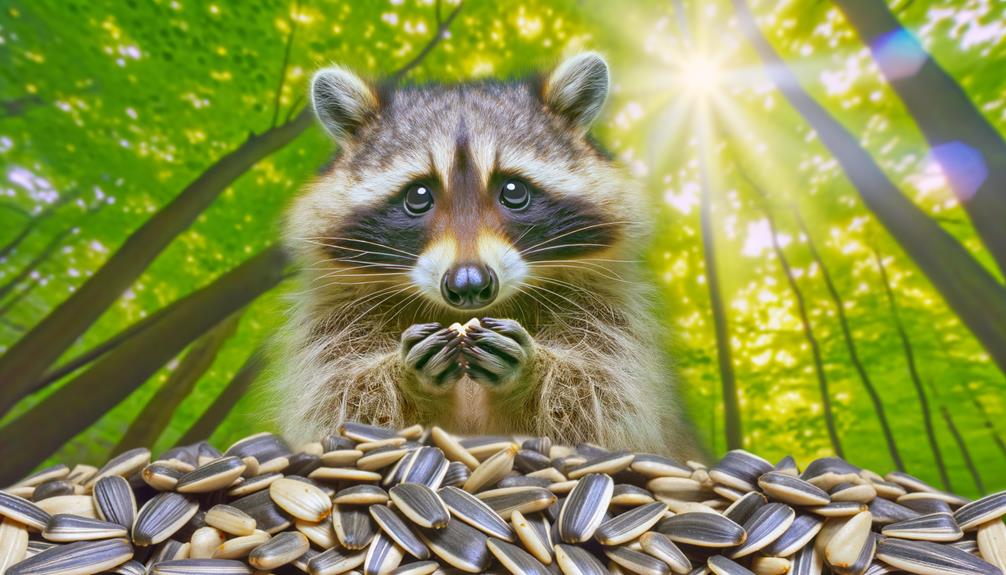
Given the significant nutritional benefits of sunflower seeds, it is relevant to observe how raccoons interact with and consume these seeds in their natural habitats.
Field studies reveal that raccoons exhibit a marked preference for sunflower seeds, often prioritizing them over other available food sources. Behavioral observations indicate that raccoons employ their dexterous front paws to extract seeds from sunflower heads or feeders. Consumption patterns show they can ingest substantial quantities in one sitting, suggesting a high level of palatability.
Additionally, camera traps and direct observations confirm that raccoons are mainly nocturnal in their feeding habits, frequently visiting areas where sunflower seeds are present. These findings underscore the role of sunflower seeds as a favored component in the raccoon diet.
Seasonal Variations in Diet
Throughout the year, raccoon dietary patterns exhibit significant seasonal variations, influenced by the availability of different food sources. In spring, raccoons primarily consume insects, amphibians, and young birds, capitalizing on the abundance of these protein-rich foods.
Summer diets shift towards fruits, berries, and vegetables, reflecting the seasonal ripening of these plant materials. Fall sees a focus on nuts, acorns, and corn, which are high in fats and carbohydrates, essential for building fat reserves for winter.
During winter, raccoons have limited access to fresh food and rely more on scavenging and stored body fat. Such dietary flexibility underscores their adaptability and opportunistic feeding behaviors, ensuring survival across diverse environments and fluctuating resource availability.
Impact on Backyard Wildlife
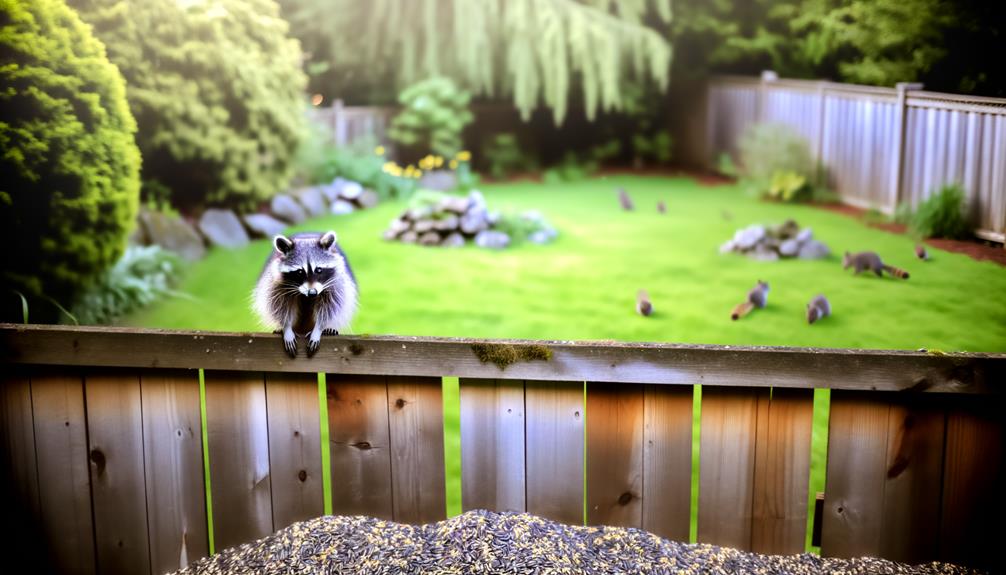
The presence of sunflower seeds in backyards has a measurable impact on attracting raccoons and other wildlife to gardens, often leading to increased nocturnal activity.
Studies indicate that raccoons exhibit specific seed consumption patterns, favoring easily accessible food sources.
Consequently, this behavior can influence the distribution and frequency of wildlife visits, altering the local ecosystem dynamics.
Attraction to Gardens
Raccoons' attraction to gardens, particularly those with sunflower seeds, can greatly impact local backyard wildlife by altering feeding patterns and increasing competition for resources. This attraction can disrupt the natural dynamics of various species, leading to unintended ecological consequences. Detailed observations indicate several key effects:
- Altered Feeding Patterns: Raccoons may monopolize food sources, forcing other wildlife to adjust their feeding habits and times.
- Increased Competition: The presence of raccoons can lead to heightened competition among native species, potentially reducing biodiversity.
- Habitat Disturbance: Raccoons often dig and forage aggressively, which can damage plants and disturb the habitats of smaller animals.
Understanding these impacts is essential for managing gardens to support a balanced ecosystem.
Seed Consumption Patterns
Examining seed consumption patterns reveals that raccoons have a substantial impact on backyard wildlife by altering the availability and distribution of sunflower seeds. Raccoons are opportunistic feeders, consuming a wide range of foods, including sunflower seeds.
Studies indicate that raccoons can deplete seed supplies intended for birds, affecting avian feeding behaviors and population dynamics. Data shows that raccoons can consume up to 50% of the sunflower seeds provided in bird feeders, thereby reducing the food available to other wildlife.
This redistribution not only influences the feeding patterns of birds but also impacts the overall biodiversity in the area. Understanding these consumption patterns is critical for managing backyard ecosystems and ensuring balanced wildlife populations.
Tips for Managing Raccoons
Implementing effective strategies for managing raccoons begins with understanding their behavior and dietary preferences, including their attraction to sunflower seeds. Raccoons are opportunistic feeders and are drawn to easily accessible food sources.
To mitigate this issue, consider the following measures:
- Secure Trash Bins: Use raccoon-proof lids and place bins in enclosed areas to limit access to potential food sources.
- Remove Bird Feeders: Temporarily removing or securing bird feeders can reduce raccoon attraction, as they are known to raid feeders for seeds.
- Eliminate Shelter Opportunities: Regularly inspect and seal entry points in attics, sheds, and basements to prevent raccoons from nesting.
These data-driven tips can help manage raccoon populations effectively, minimizing their disruptive presence.
Conclusion
To sum up, raccoons exhibit a diverse diet that includes a wide array of foods, such as sunflower seeds, which cater to their omnivorous nature and nutritional needs.
Much like opportunistic foragers in a bustling marketplace, raccoons adapt their eating habits according to seasonal availability and environmental conditions.
This adaptability not only influences backyard wildlife dynamics but also necessitates effective management strategies to mitigate potential conflicts.
Observational data underscore the importance of understanding these dietary preferences for ecological balance.

